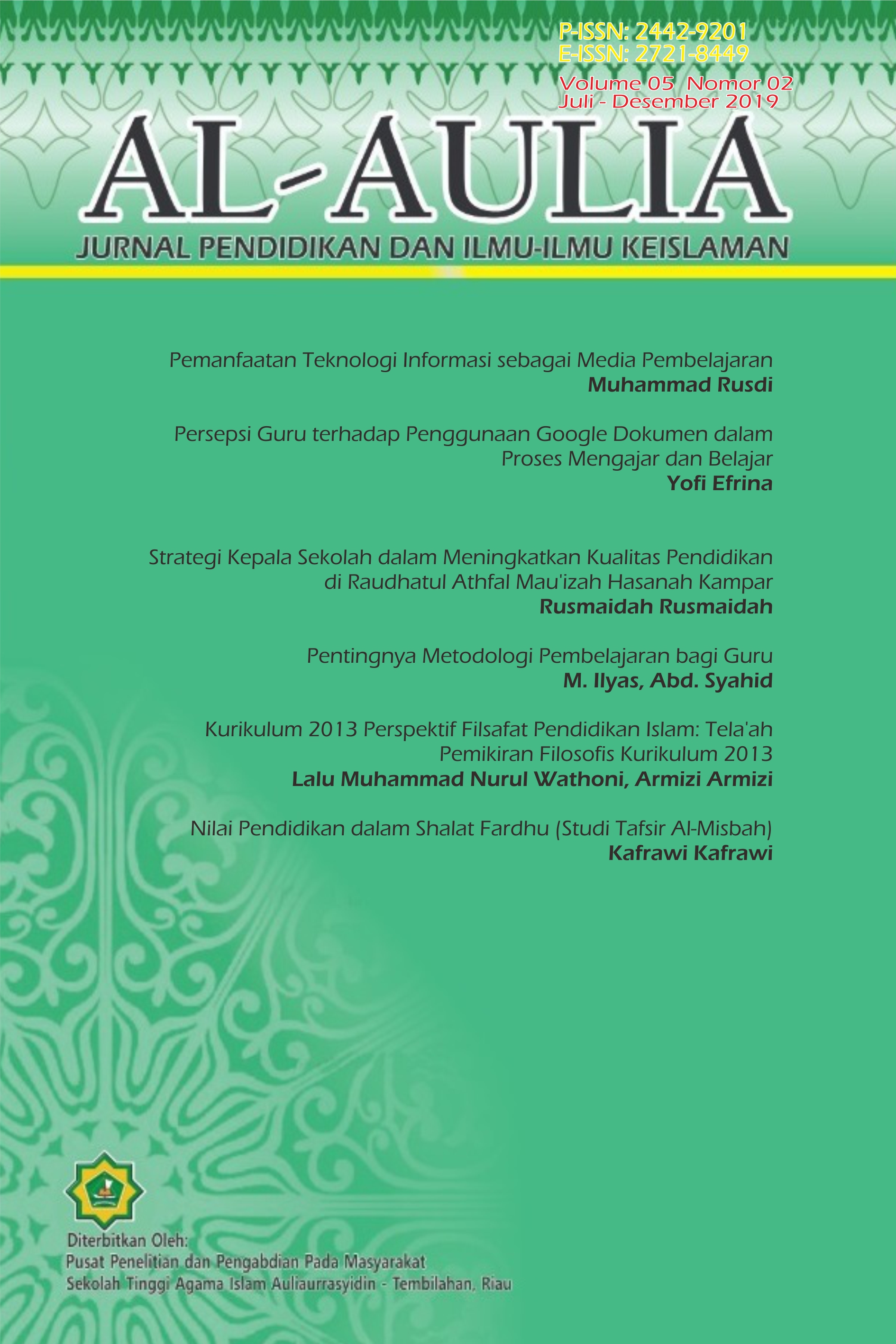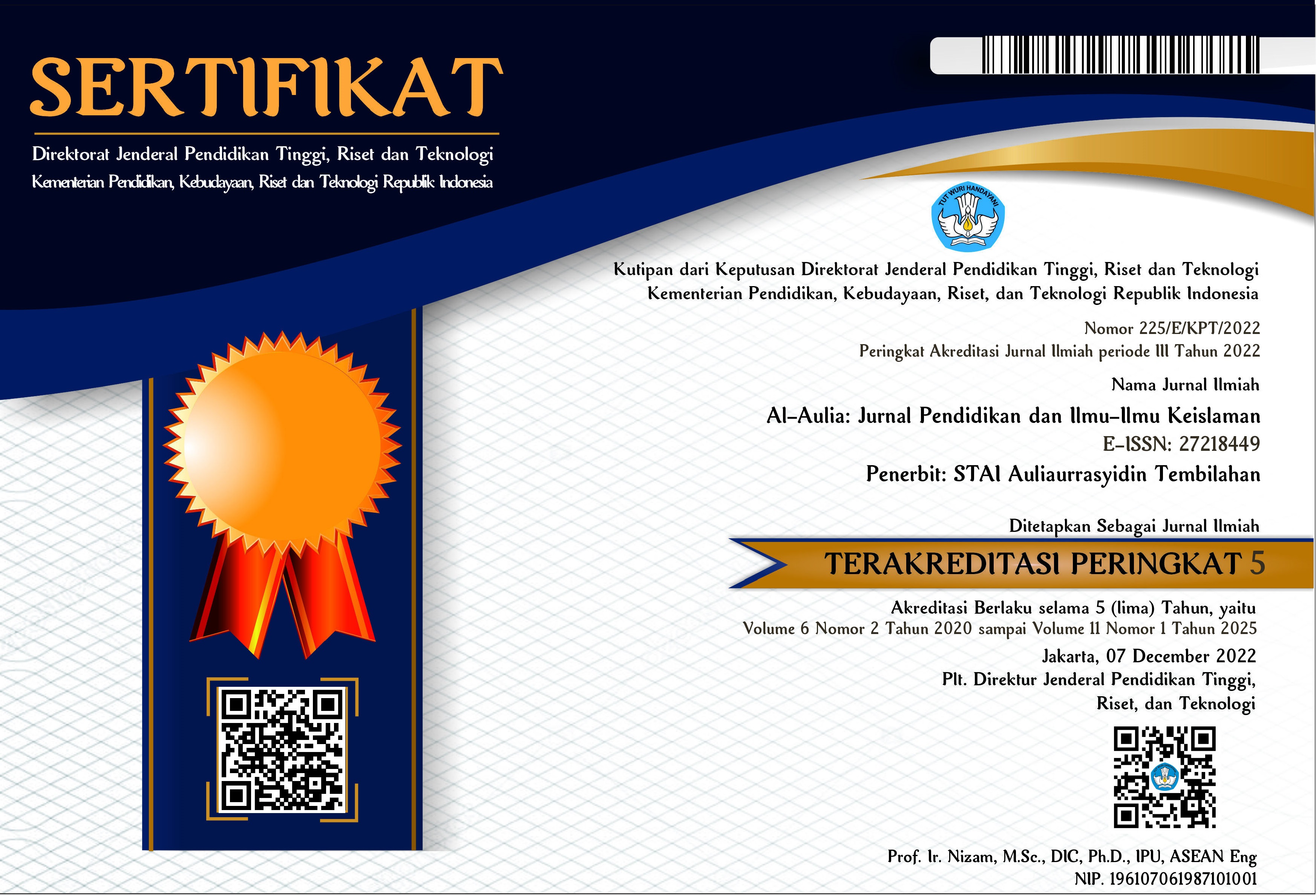Strategi Kepala Sekolah dalam Meningkatkan Kualitas Pendidikan di Raudhatul Athfal Mau'izah Hasanah Kampar
Keywords:
Principal Strategies, Education Quality, Case Study, School Management, Educational LeadershipAbstract
This study aims to analyze the principal's strategies in improving the quality of education at R.A Mau'izah Hasanah Kampar. This research employs a qualitative approach with a case study method, where data is collected through in-depth interviews, participatory observations, and document analysis. The findings indicate that the principal implements various strategies, including strengthening the school's vision and mission, enhancing teacher competencies, optimizing school management, and increasing parental and community involvement. The vision and mission are reinforced through intensive communication with all school stakeholders, while teacher competency development is facilitated through professional training and academic supervision. School management optimization is carried out by improving infrastructure and implementing a technology-based administrative system. Additionally, the principal strives to enhance parental and community engagement through school partnership programs. Although these strategies positively impact educational quality, challenges remain in their implementation, such as limited teaching staff and low parental participation. Therefore, support from various stakeholders, including the government, educators, and the community, is essential to ensure the effective implementation of these strategies.
References
Banun, S., Yusrizal, & Usman, N. (2016). Strategi Kepala Sekolah dalam Meningkatkan Mutu Pendidikan pada SMP Negeri 2 Unggul Mesjid Raya Kabupaten Aceh Besar. Jurnal Administrasi Pendidikan, 4(1), 139.
Bowen, G. A. (2009). Document Analysis as a Qualitative Research Method. Qualitative Research Journal, 9(2), 27-40.
Braun, V., & Clarke, V. (2006). Using Thematic Analysis in Psychology. Qualitative Research in Psychology, 3(2), 77-101.
Creswell, J. W. (2014). Research Design: Qualitative, Quantitative, and Mixed Methods Approaches (4th ed.). SAGE Publications.
Day, C., & Sammons, P. (2014). Successful School Leadership. Education Development Trust.
Denzin, N. K. (2012). The Qualitative Manifesto: A Call to Arms. Left Coast Press.
Epstein, J. L. (2011). School, Family, and Community Partnerships: Preparing Educators and Improving Schools (2nd ed.). Routledge.
Guskey, T. R. (2002). Professional Development and Teacher Change. Teachers and Teaching: Theory and Practice, 8(3), 381-391.
Heckman, J. J. (2006). Skill Formation and the Economics of Investing in Disadvantaged Children. Science, 312(5782), 1900-1902.
Hoy, W. K., & Miskel, C. G. (2012). Educational Administration: Theory, Research, and Practice (9th ed.). McGraw-Hill.
Leithwood, K., & Jantzi, D. (2006). Transformational School Leadership for Large-Scale Reform. Journal of Educational Administration, 43(4), 362-386.
Lincoln, Y. S., & Guba, E. G. (1985). Naturalistic Inquiry. SAGE Publications.
Merriam, S. B. (2009). Qualitative Research: A Guide to Design and Implementation. Jossey-Bass.
Miles, M. B., Huberman, A. M., & Saldaña, J. (2014). Qualitative Data Analysis: A Methods Sourcebook (3rd ed.). SAGE Publications.
Mubarok, H., & Bisri, M. (2018). Kepemimpinan Kepala Sekolah dalam Meningkatkan Mutu Pendidikan. Jurnal Manajemen Pendidikan Islam, 6(2), 45–60.
Mulyasa, E. (2013). Menjadi Kepala Sekolah Profesional. PT Remaja Rosdakarya.
Patton, M. Q. (2015). Qualitative Research & Evaluation Methods (4th ed.). SAGE Publications.
Peraturan Menteri Pendidikan Nasional Republik Indonesia Nomor 137 Tahun 2014 tentang Standar Nasional Pendidikan Anak Usia Dini.
Sergiovanni, T. J. (2015). The Principalship: A Reflective Practice Perspective (6th ed.). Pearson.
Sofyan, H. (2013). Peningkatan Mutu Pendidikan Dasar. Prestasi Pustaka.
Yin, R. K. (2018). Case Study Research and Applications: Design and Methods (6th ed.). SAGE Publications.
Downloads
Published
Issue
Section
License
Copyright (c) 2019 Rusmaidah Rusmaidah

This work is licensed under a Creative Commons Attribution-ShareAlike 4.0 International License.
Authors who publish with this journal agree to the following terms:
1. Copyright on any article is retained by the author(s).
2. The author grants the journal, right of first publication with the work simultaneously licensed under a Creative Commons Attribution License that allows others to share the work with an acknowledgment of the work’s authorship and initial publication in this journal.
3. Authors are able to enter into separate, additional contractual arrangements for the non-exclusive distribution of the journal’s published version of the work (e.g., post it to an institutional repository or publish it in a book), with an acknowledgment of its initial publication in this journal.
4. Authors are permitted and encouraged to post their work online (e.g., in institutional repositories or on their website) prior to and during the submission process, as it can lead to productive exchanges, as well as earlier and greater citation of published work.
5. The article and any associated published material is distributed under the Creative Commons Attribution-ShareAlike 4.0 International License







